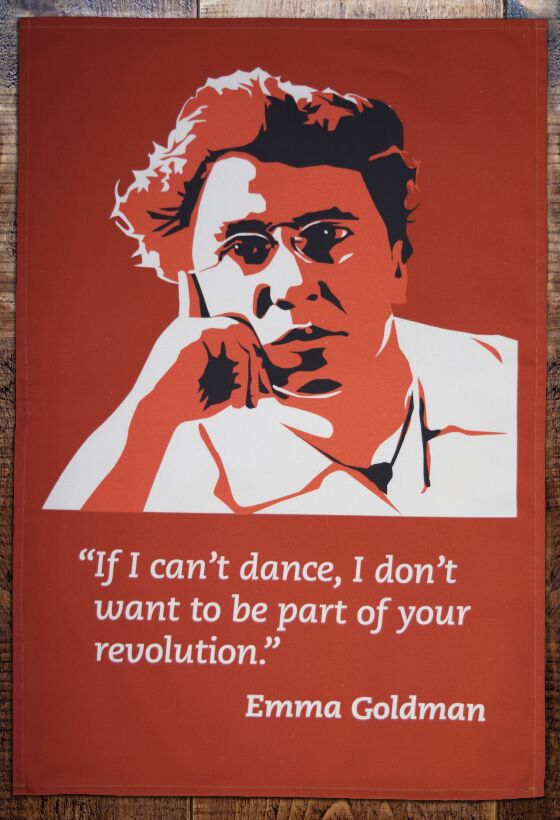Red Emma Goldman: Suppressed in her Time, but not Forgotten in ours
Posted by Pete on Jun 27th 2018
Left-wingers sometimes ask, resentfully, 'Why is there no socialism in the USA?'
The point isn't 100% true, but you can't deny that socialism has had a far less successful past century in the United States than it has everywhere else in the world.
A quick reflection on the formidable life of Emma Goldman - born today back in 1869 - offers a reason why.

Goldman's disillusionment with Russia
Goldman wasn't a socialist - she was an anarchist - but the two ideologies share a lot in common.
Emma was born into a poor Jewish family in the Lithuanian province of Kovno, but by the mid-1880s, under the pressure of rising anti-Semitism in the Russian Empire, they had all emigrated to New York.
(Interesting coincidence: my mum's family hail from the same area of Lithuania and left for the same reason. Only we moved to rainy Glasgow rather than the Big Apple...)
As soon as she arrived in the US, Goldman began to gravitate towards radical working class politics. She'd always had a rebellious spirit (as a young child Emma had seen a peasant beaten by a Russian lord, resolving thereafter to always oppose violent authority), and this led to her interest in the growing anarchist movement on the East Coast.
Emma's 'interest' very quickly became active involvement after the Haymarket Affair of 1887, when four anarchists were executed on very dubious grounds amid industrial action in Chicago.

Red Emma Speaks
Enraged by this injustice, Goldman dived headlong into American anarchism and its anti-authoritarian politics. Her oratorical skill and activist courage soon made her one of the most famous Leftists in the United States.
By 1893, when the US economy was hit by a major depression, Goldman was one of the best assets the hard-hit American working class had. She toured the country, agitating against capitalism and the unemployment and poverty its latest crisis had brought down on the people.
In New York, at the height of summer, she shouted to a massive crowd: "Demonstrate before the palaces of the rich; demand work. If they do not give you work, demand bread. If they deny you both, take bread."
For this speech she was (not for the last time) thrown in prison for 'incitement to riot'. While behind bars, Emma used her newfound free time to read many of the great progressive authors of the day - people like Henry David Thoreau, Walt Whitman, and John Stuart Mill.
American suppression of the left
When she got out, Goldman charged straight back into the political struggle. But over the next two decades, the American state - whether in Republican or Democratic hands - became more and more repressive towards anti-capitalist movements, both anarchist and socialist.
This was a shameful period in US history, when the freedoms its War of Independence and Civil War had supposedly won were often put to one side in the interest of protecting big business. Leftists were routinely beaten up, arrested, and sometimes killed by government operatives.
Things came to a head over World War One. Americans who opposed the war - of whom Emma Goldman was one of the most well-known - met with the fury of the establishment.
Eugene Debs, the leader of the Socialist Party of America, was sentenced to ten years for advocating resistance to conscription (he ran for the Presidency from prison in 1920, securing almost a million votes).
In June 1917, Goldman too was thrown in jail for two years on the same grounds. She wrote to a friend:
"two years imprisonment for having made an uncompromising stand for one's ideals. Why, that is a small price." - Emma Goldman
Keep the faith in red Emma's vision
Upon her release, Goldman was deported to Russia without any legal justification (she'd been an American citizen for three decades). She returned to the US just once before her death in 1940.
It is in this period around the turn of the twentieth century, when the American state was violently repressing the anti-capitalist politics of people like Emma Goldman and Eugene Debs, that we find an answer to the curious absence of socialism in the contemporary United States.
But keep faith: Leftist politics has had a place in America before, and it may be coming back into fashion. Two years ago, a man openly describing himself as a 'democratic socialist' - one Bernie Sanders - came very close to a run at the White House.
And, in the resistance to that building's current occupant, many are looking to the deep past - to the Emma Goldman-era - for new futures.
